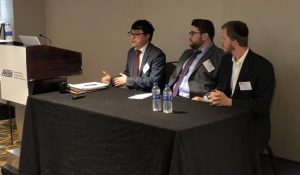“Understanding Project Cancellation Risks in U.S. P3 Surface Transportation Infrastructure”
The U.S. public sector has become increasingly interested in attracting private sector resources via public-private partnerships (P3s) when financing and delivering surface transportation and transit projects. Nevertheless, poorly managed political and economic risks have potential to drive P3 projects into contract renegotiations, bankruptcies, early contract terminations, deferrals, and, in the most extreme cases, outright cancellations. In response, this research explores the link between political risks, exogenous economic conditions, and project outcomes within the increasingly strained U.S. surface transportation P3 market. Specifically, the paper investigates how frequently P3 projects get cancelled, deferred, or terminated (CDT) and why.
The authors compiled a dataset coving the whole U.S. surface transportation P3 project population (68 projects), including information on project stages and associated CDT risks. Data collection efforts focused on primary data sources available from government agencies, project documentation, and specialized news sources. Risk factors were coded into four categories: bureaucratic complexity (intergovernmental conflicts, inadequate contract terms); public voice (local opposition, ideological opposition), political voice (political transitions, legislative change, political opposition), and economic complications. Of the 68 projects examined, 37% were cancelled, 3% were deferred, and 6% had their contracts terminated early. Overall, these CDTs made up 46% of all U.S. surface transportation P3 projects.
Political risks contributed to 19 of 25 project cancellations, 1 out of 2 deferrals, and 2 out of 4 early terminations. Bureaucratic complexity influenced several database cases but was not as common as other risk factors. When they occurred, inadequate contract terms tended to generate destructive power imbalances within partnerships or legal vulnerabilities that voided project terms. Multi-level governance influenced intergovernmental conflicts, but also allowed for decentralized input and decision-making from several levels of government. Learning across the industry and within government may explain the low frequency of bureaucratic complexity in recent years.
Local and ideological opposition to environmental impacts, noise pollution, and eminent domain seizures appeared frequently among the CDTs, along with anti-corporate mistrust and opposition to project costs. Public voice often produced political activity and/or compounded economic complications to undermine the database projects. Jurisdictions with strong public voice traditions should prioritize public engagement when pursuing large scale investment decisions in their communities. In addition, projects with high environmental risks were frequently subject to both public and ideological opposition. In cases where ideological opposition is present, better due diligence is needed to fully assess whether a P3 approach is appropriate. This appears particularly important for complex P3 delivery models like DBFOM and DBOM contracts given their complex risk-sharing arrangements, project structures, potential benefits, and benefit schedules.
Economic risks contributed to 16 out of 25 cancellations, 1 out of 2 deferrals, and 3 out of 4 early terminations. Several database projects presented insufficient economic viability to reach completion, demonstrating how P3 delivery most likely cannot turn an unviable project into a viable one. In addition, even well-developed projects failed under unfavorable fiscal and/or market conditions. Improved due diligence, evaluation criteria, usage best practices, and competitive processes (public and private) appear critical for successful P3 project selection and for avoiding the business-practice and competitiveness issues that can undermine otherwise promising projects. Ongoing sensitivity analyses for fiscal constraints, demand projections, and interest rate projections probably can also improve risk management. Finally, the high number of projects cancelled rather than deferred suggests that the market might benefit from better mechanisms for deferring projects until more advantageous economic conditions arise.
Ultimately, the study findings suggest that all four potential drivers – bureaucratic complexity, public voice, political voice, and economic complications – played a strong role in U.S. surface transportation P3 CDTs. The findings also suggest that troubled projects reflect broad economic and political risk management failures by both the public and the private sectors. Nevertheless, CDTs do not necessarily indicate inherent flaws in P3 projects or their deal structures. Political risk and/or economic factors might simply overwhelm an otherwise viable project. Overall, improved risk awareness and risk mitigation strategies, especially stronger due diligence and community engagement, might reduce CDTs in future.
For more information please contact: Lauren N. McCarthy lmccart5@gmu.edu
Citation:
Lauren N. McCarthy, Lisardo Bolaños, Jeong Yun Kweun, Jonathan Gifford. “Understanding project cancellation risks in U.S. P3 surface transportation infrastructure.” Transport Policy (2019) https://doi.org/10.1016/j.tranpol.2019.10.009.

